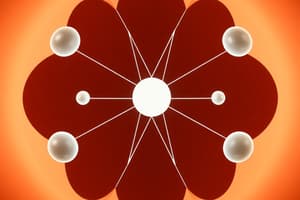Podcast
Questions and Answers
What type of objects does Discrete Mathematics deal with?
What type of objects does Discrete Mathematics deal with?
- Objects that are continuously changing
- Objects that can be counted and are not connected (correct)
- Objects that cannot be counted
- Objects that are continuously connected
What are some examples of discrete objects?
What are some examples of discrete objects?
- Houses, trees, desks (correct)
- Rivers, mountains, oceans
- Clouds, air, sunlight
- Cars, bicycles, motorcycles
What is logic in the context of Discrete Mathematics?
What is logic in the context of Discrete Mathematics?
- A method for counting
- A technique for graphical representation
- A tool for continuous objects
- A language for reasoning (correct)
What does dealing with discrete objects in Discrete Mathematics require?
What does dealing with discrete objects in Discrete Mathematics require?
Why does logic need rules associated with it?
Why does logic need rules associated with it?
Flashcards are hidden until you start studying
Study Notes
Discrete Mathematics
- Deals with discrete objects, which are distinct and individual, having no intermediate values
- Examples of discrete objects include:
- Integers (e.g., 1, 2, 3)
- Finite sequences (e.g., 0, 1, 1, 2, 3, 5, 8)
- Booleans (e.g., true or false)
- Graphs (e.g., social networks, web graphs)
- Finite strings (e.g., "hello", "abcdefg")
Logic in Discrete Mathematics
- Logic is the systematic study of the principles of valid inference and reasoning
- In Discrete Mathematics, logic is used to develop and analyze mathematical arguments
- It involves the use of logical operators, such as NOT, AND, and OR, to construct and manipulate statements
Dealing with Discrete Objects
- Dealing with discrete objects in Discrete Mathematics requires:
- A precise and unambiguous language
- A set of rules to govern the manipulation of statements
- The ability to reason logically and make sound arguments
Rules of Logic
- Logic needs rules associated with it to ensure:
- Consistency and validity of arguments
- Avoidance of ambiguity and contradiction
- Correctness and reliability of conclusions
Studying That Suits You
Use AI to generate personalized quizzes and flashcards to suit your learning preferences.




